Unit 2 Lessons in life Using language课件(共22张PPT)--2024-2025学年高中《英语》选择性必修4(外研版)
文档属性
| 名称 | Unit 2 Lessons in life Using language课件(共22张PPT)--2024-2025学年高中《英语》选择性必修4(外研版) |  | |
| 格式 | pptx | ||
| 文件大小 | 6.0MB | ||
| 资源类型 | 教案 | ||
| 版本资源 | 外研版(2019) | ||
| 科目 | 英语 | ||
| 更新时间 | 2025-07-08 22:00:05 | ||
图片预览


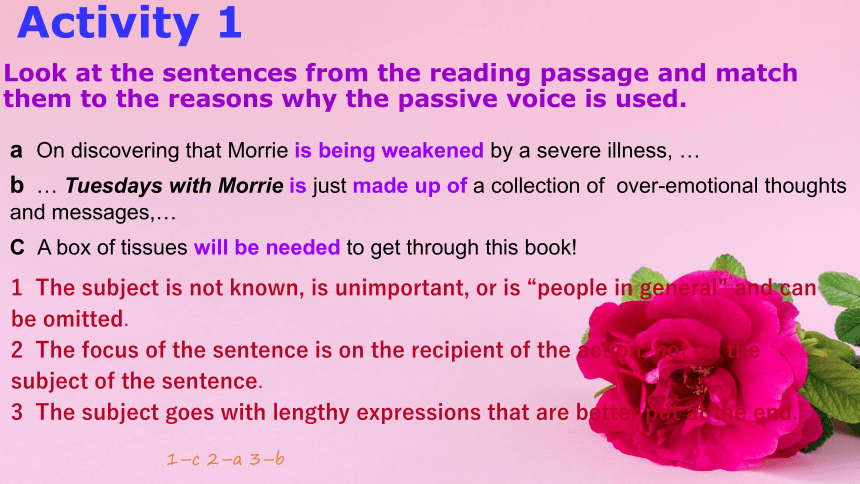
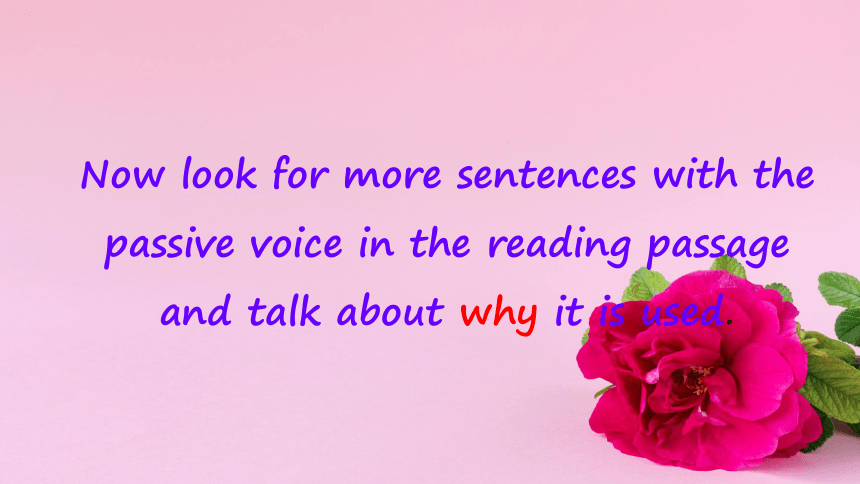
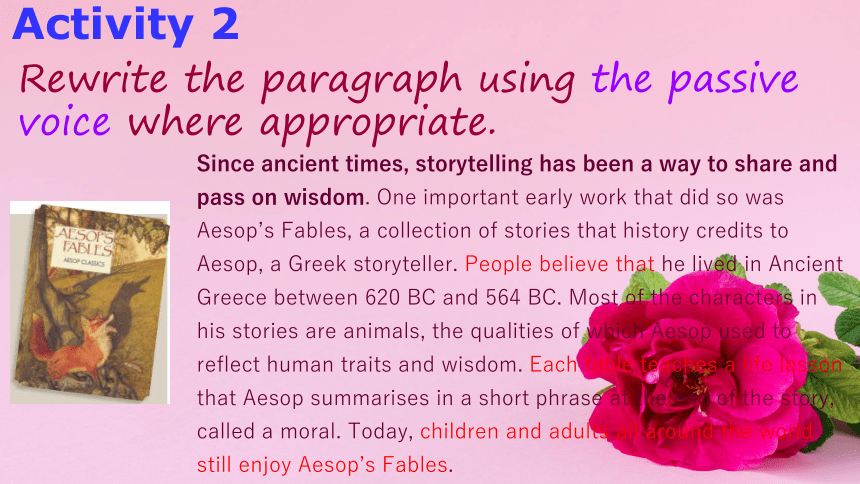
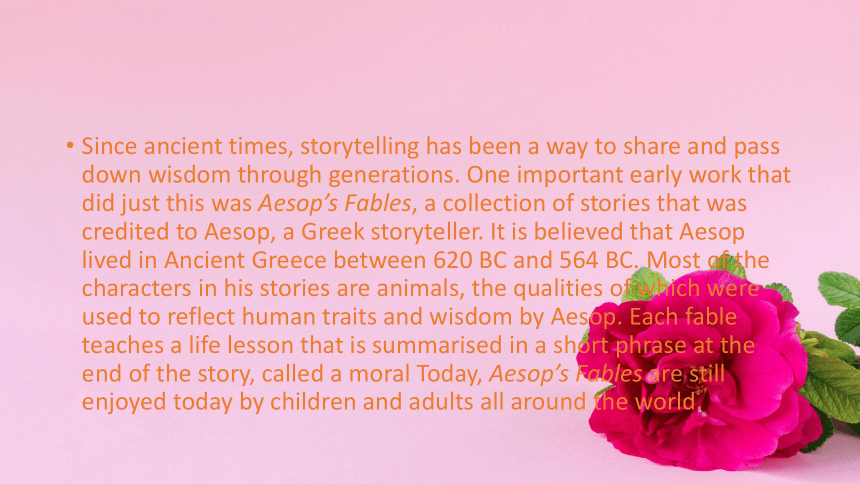
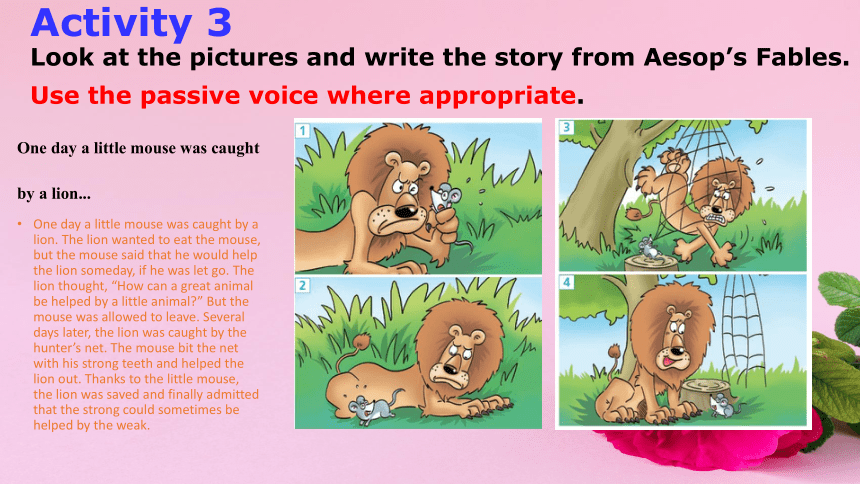
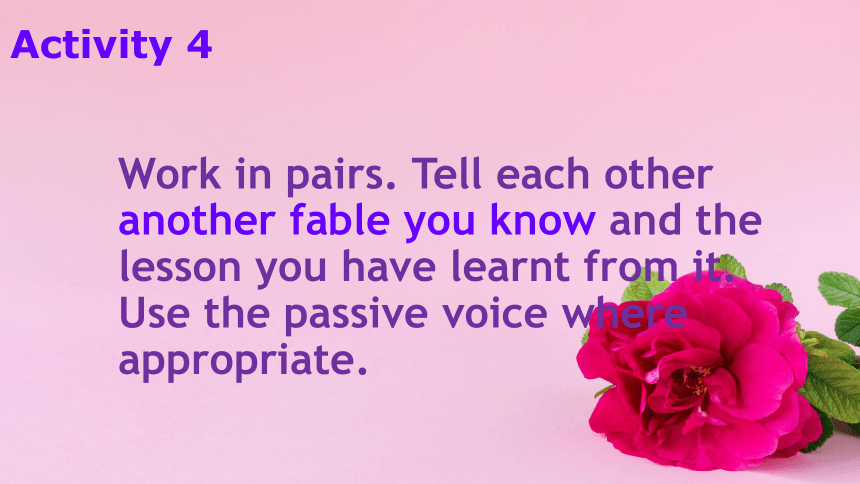
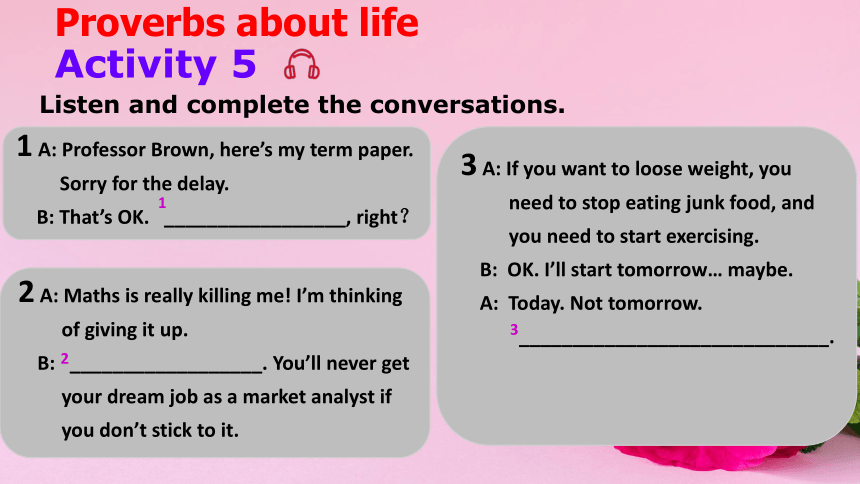
文档简介
(共22张PPT)
Unit 2 Lessons in life
Using language
新标准《英语》高中选择性必修第四册
Review: passive voice
Activity 1
a On discovering that Morrie is being weakened by a severe illness, …
b … Tuesdays with Morrie is just made up of a collection of over-emotional thoughts and messages,…
C A box of tissues will be needed to get through this book!
1 The subject is not known, is unimportant, or is “people in general” and can be omitted.
2 The focus of the sentence is on the recipient of the action, not on the subject of the sentence.
3 The subject goes with lengthy expressions that are better put at the end.
Look at the sentences from the reading passage and match them to the reasons why the passive voice is used.
1–c 2–a 3–b
Now look for more sentences with the passive voice in the reading passage and talk about why it is used.
Activity 2
Rewrite the paragraph using the passive voice where appropriate.
Since ancient times, storytelling has been a way to share and pass on wisdom. One important early work that did so was Aesop’s Fables, a collection of stories that history credits to Aesop, a Greek storyteller. People believe that he lived in Ancient Greece between 620 BC and 564 BC. Most of the characters in his stories are animals, the qualities of which Aesop used to reflect human traits and wisdom. Each fable teaches a life lesson that Aesop summarises in a short phrase at the end of the story, called a moral. Today, children and adults all around the world still enjoy Aesop’s Fables.
Since ancient times, storytelling has been a way to share and pass down wisdom through generations. One important early work that did just this was Aesop’s Fables, a collection of stories that was credited to Aesop, a Greek storyteller. It is believed that Aesop lived in Ancient Greece between 620 BC and 564 BC. Most of the characters in his stories are animals, the qualities of which were used to reflect human traits and wisdom by Aesop. Each fable teaches a life lesson that is summarised in a short phrase at the end of the story, called a moral Today, Aesop’s Fables are still enjoyed today by children and adults all around the world.
Activity 3
One day a little mouse was caught by a lion...
One day a little mouse was caught by a lion. The lion wanted to eat the mouse, but the mouse said that he would help the lion someday, if he was let go. The lion thought, “How can a great animal be helped by a little animal ” But the mouse was allowed to leave. Several days later, the lion was caught by the hunter’s net. The mouse bit the net with his strong teeth and helped the lion out. Thanks to the little mouse, the lion was saved and finally admitted that the strong could sometimes be helped by the weak.
Look at the pictures and write the story from Aesop’s Fables. Use the passive voice where appropriate.
Activity 4
Work in pairs. Tell each other another fable you know and the lesson you have learnt from it. Use the passive voice where appropriate.
Proverbs about life
Activity 5
1 A: Professor Brown, here’s my term paper.
Sorry for the delay.
B: That’s OK. _________________, right?
1
2 A: Maths is really killing me! I’m thinking
of giving it up.
B: __________________. You’ll never get
your dream job as a market analyst if
you don’t stick to it.
3 A: If you want to loose weight, you
need to stop eating junk food, and
you need to start exercising.
B: OK. I’ll start tomorrow… maybe.
A: Today. Not tomorrow.
_____________________________.
2
3
Listen and complete the conversations.
4 A: I’m glad you finally got here.
B: My car had a flat tyre on the way.
Anyway, ____________________.
4
5 A: With my brother’s help, I finally
completed my biology project!
B: Congratulations. ________________.
5
6 A: I heard that Mary is going to invest all
her money in this programme.
B: That’s not wise. As people usually say,
“ ________________”. I’ll talk to her
as soon as possible.
6
1 Better late than never.
2 No pain, no gain.
3 Never put off until tomorrow what you can do today.
4 All’s well that ends well.
5 Two heads are better than one.
6 Don’t put all of your eggs in one basket.
Activity 6
Match the proverbs in Activity 5 to their meaning.
1 ________________________: you must face challenges in order to be successful
2 ________________________: it is easier to achieve something if you cooperate with someone else
3 ________________________: doing something late is better than not doing it at all
4 ________________________: you should start things earlier rather than later
5 ________________________: do not put all your efforts or resources into doing one thing
6 ________________________: problems don’t matter if the final result is good
Now work in groups and think of other proverbs about life. Can you find Chinese proverbs with similar meanings
1 No pain, no gain.(一分耕耘,一分收获。)
2 Two heads are better than one.(三个臭皮匠,顶个诸葛亮。)
3 Better late than ever.(亡羊补牢,未为晚也。)
4 Never put off until tomorrow what you can do today.(今日事,今日毕。)
5 Don’t put all of your eggs in one basket.(不要孤注一掷。)
6 All’s well that ends well.(结果好,样样好。)
Activity 6
Activity 7
Work in pairs. Think of other situations to which these proverbs can be applied.
Activity 8
Listen to the interview and choose the
best headline.
1 University Fees Are No Barrier to Grandma!
2 Dream Comes True for Graduating Grandma
3 Janet Says “Family First! That’s what matters!”
4 How the Students Experience Has Changed with the Centuries
2
Activity 9
Listen again and complete the notes.
Interview with Janet Rose
Age: __________.
First attended university in: ____________
Reason for leaving university:
___________________________________________
Reason for going back to university:
___________________________________________
1
2
3
4
Initial feelings on returning to university:
___________________________________________
University major: ____________________
Feelings on graduation: ________________________
Advice to others: ____________________________
Future plans: _______________________________
5
6
7
8
9
Now work in pairs and talk about what you can learn from Janet’s story.
1 81
2 1955
3 To take care of her ill mother.
4 Her daughter suggested she go back to school five years ago and she jumped at the chance.
5 She felt a bit nervous at first and she felt so old.
6 American literature.
7 She feels great.
8 You’re never too old to learn.
9 Starting a master’s degree in the fall.
Activity 10
Complete the boxes with the expressions from the interview.
I started… back
in…
After that I…
But then five years
ago, …
I felt… at first.
I suggest that…
Remember, …
Talking about experiences
Giving advice
Talking about experiences
I started… back in…
After that I…
But then five years ago…
I felt… at first.
Giving advice
I suggest that…
Remember, …
Activity 11
Work in pairs. Tell each other a story about yourself that can be summarised by a proverb in this situation.
Now talk about how effectively you and your partner used your own experiences to illustrate your under-standing of the proverbs.
THANK YOU
Unit 2 Lessons in life
Using language
新标准《英语》高中选择性必修第四册
Review: passive voice
Activity 1
a On discovering that Morrie is being weakened by a severe illness, …
b … Tuesdays with Morrie is just made up of a collection of over-emotional thoughts and messages,…
C A box of tissues will be needed to get through this book!
1 The subject is not known, is unimportant, or is “people in general” and can be omitted.
2 The focus of the sentence is on the recipient of the action, not on the subject of the sentence.
3 The subject goes with lengthy expressions that are better put at the end.
Look at the sentences from the reading passage and match them to the reasons why the passive voice is used.
1–c 2–a 3–b
Now look for more sentences with the passive voice in the reading passage and talk about why it is used.
Activity 2
Rewrite the paragraph using the passive voice where appropriate.
Since ancient times, storytelling has been a way to share and pass on wisdom. One important early work that did so was Aesop’s Fables, a collection of stories that history credits to Aesop, a Greek storyteller. People believe that he lived in Ancient Greece between 620 BC and 564 BC. Most of the characters in his stories are animals, the qualities of which Aesop used to reflect human traits and wisdom. Each fable teaches a life lesson that Aesop summarises in a short phrase at the end of the story, called a moral. Today, children and adults all around the world still enjoy Aesop’s Fables.
Since ancient times, storytelling has been a way to share and pass down wisdom through generations. One important early work that did just this was Aesop’s Fables, a collection of stories that was credited to Aesop, a Greek storyteller. It is believed that Aesop lived in Ancient Greece between 620 BC and 564 BC. Most of the characters in his stories are animals, the qualities of which were used to reflect human traits and wisdom by Aesop. Each fable teaches a life lesson that is summarised in a short phrase at the end of the story, called a moral Today, Aesop’s Fables are still enjoyed today by children and adults all around the world.
Activity 3
One day a little mouse was caught by a lion...
One day a little mouse was caught by a lion. The lion wanted to eat the mouse, but the mouse said that he would help the lion someday, if he was let go. The lion thought, “How can a great animal be helped by a little animal ” But the mouse was allowed to leave. Several days later, the lion was caught by the hunter’s net. The mouse bit the net with his strong teeth and helped the lion out. Thanks to the little mouse, the lion was saved and finally admitted that the strong could sometimes be helped by the weak.
Look at the pictures and write the story from Aesop’s Fables. Use the passive voice where appropriate.
Activity 4
Work in pairs. Tell each other another fable you know and the lesson you have learnt from it. Use the passive voice where appropriate.
Proverbs about life
Activity 5
1 A: Professor Brown, here’s my term paper.
Sorry for the delay.
B: That’s OK. _________________, right?
1
2 A: Maths is really killing me! I’m thinking
of giving it up.
B: __________________. You’ll never get
your dream job as a market analyst if
you don’t stick to it.
3 A: If you want to loose weight, you
need to stop eating junk food, and
you need to start exercising.
B: OK. I’ll start tomorrow… maybe.
A: Today. Not tomorrow.
_____________________________.
2
3
Listen and complete the conversations.
4 A: I’m glad you finally got here.
B: My car had a flat tyre on the way.
Anyway, ____________________.
4
5 A: With my brother’s help, I finally
completed my biology project!
B: Congratulations. ________________.
5
6 A: I heard that Mary is going to invest all
her money in this programme.
B: That’s not wise. As people usually say,
“ ________________”. I’ll talk to her
as soon as possible.
6
1 Better late than never.
2 No pain, no gain.
3 Never put off until tomorrow what you can do today.
4 All’s well that ends well.
5 Two heads are better than one.
6 Don’t put all of your eggs in one basket.
Activity 6
Match the proverbs in Activity 5 to their meaning.
1 ________________________: you must face challenges in order to be successful
2 ________________________: it is easier to achieve something if you cooperate with someone else
3 ________________________: doing something late is better than not doing it at all
4 ________________________: you should start things earlier rather than later
5 ________________________: do not put all your efforts or resources into doing one thing
6 ________________________: problems don’t matter if the final result is good
Now work in groups and think of other proverbs about life. Can you find Chinese proverbs with similar meanings
1 No pain, no gain.(一分耕耘,一分收获。)
2 Two heads are better than one.(三个臭皮匠,顶个诸葛亮。)
3 Better late than ever.(亡羊补牢,未为晚也。)
4 Never put off until tomorrow what you can do today.(今日事,今日毕。)
5 Don’t put all of your eggs in one basket.(不要孤注一掷。)
6 All’s well that ends well.(结果好,样样好。)
Activity 6
Activity 7
Work in pairs. Think of other situations to which these proverbs can be applied.
Activity 8
Listen to the interview and choose the
best headline.
1 University Fees Are No Barrier to Grandma!
2 Dream Comes True for Graduating Grandma
3 Janet Says “Family First! That’s what matters!”
4 How the Students Experience Has Changed with the Centuries
2
Activity 9
Listen again and complete the notes.
Interview with Janet Rose
Age: __________.
First attended university in: ____________
Reason for leaving university:
___________________________________________
Reason for going back to university:
___________________________________________
1
2
3
4
Initial feelings on returning to university:
___________________________________________
University major: ____________________
Feelings on graduation: ________________________
Advice to others: ____________________________
Future plans: _______________________________
5
6
7
8
9
Now work in pairs and talk about what you can learn from Janet’s story.
1 81
2 1955
3 To take care of her ill mother.
4 Her daughter suggested she go back to school five years ago and she jumped at the chance.
5 She felt a bit nervous at first and she felt so old.
6 American literature.
7 She feels great.
8 You’re never too old to learn.
9 Starting a master’s degree in the fall.
Activity 10
Complete the boxes with the expressions from the interview.
I started… back
in…
After that I…
But then five years
ago, …
I felt… at first.
I suggest that…
Remember, …
Talking about experiences
Giving advice
Talking about experiences
I started… back in…
After that I…
But then five years ago…
I felt… at first.
Giving advice
I suggest that…
Remember, …
Activity 11
Work in pairs. Tell each other a story about yourself that can be summarised by a proverb in this situation.
Now talk about how effectively you and your partner used your own experiences to illustrate your under-standing of the proverbs.
THANK YOU
